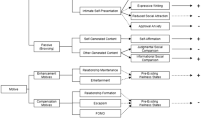Abstract
Children's perceptions concerning health-related actions exchanged with parents, siblings, and school personnel were studied. Five- to twelve-year-olds (n = 1,674) reported receiving and initiating health actions related mainly to the promotion of healthy lifestyle behaviors, but promotion of harmonious interpersonal relationships, helping behaviors, and therapeutic acts also occur Results show that children do not see themselves solely as receiving health care and advice from others, but also as acting upon others' health. The findings provide information about children's perceptions of bidirectional health-related actions between themselves and others; aspects of health cognitions and health socialization that have received little attention and that are of interest from a primary prevention perspective.
Similar content being viewed by others
REFERENCES
Backett, K., & Alexander, H. (1989). Talking to young children about health: Methods and findings. Health Education Journal, 50, 34-58.
Bibace, R., & Walsh, M. E. (1981). Children's conceptions of illness. In R. Bibace, & M. E. Walsh (Eds.), New directions for child development: Vol. 14. Children's conceptions of health, illness, and bodily functions (pp. 31-48). San Francisco: Jossey-Bass.
Bird, J. A., & Podmore, V. N. (1990). Children's understanding of health and illness. Psychology and Health, 4, 175-185.
Burbach, D. J., & Peterson, L. (1986). Children's concepts of physical illness: A review and critique of the cognitive-develomental literature. Health Psychology, 5(3), 307-325.
Carey, S. (1985). Conceptual change in childhood. London: Methuen.
Colin, C., Lavoie, J. P., & Poulin, C. (1989). Les personnes défavorisées. [Disadvantaged persons]. (Collection Et la santé, ça va? no 3). Québec, Canada: Les Publications du Québec.
Eisenberg, N. (1992). The caring child. Cambridge, MA: Harvard University Press.
Eisenberg, N., & Mussen, P. H. (1989). The roots of prosocial behavior in children. Cambridge, MA: Cambridge University Press.
Eiser, C., Patterson, D., & Eiser, R. (1983). Children's knowledge of health and illness: Implications for health education. Child-Care, Health and Development, 9, 285-292.
Elias, M.J. (1995). Primary prevention as health and social competence promotion. Journal of Primary Prevention, 16, 5-24.
Émond, A. (Ed.). (1988). Et la santé, ça va? Tome 1: Rapport de l'enquête Santé Québec 1987. [How's your health? Vol. 1. Report on the 1987 Santé Québec survey]. Québec, Canada: Ministère de la Santé et des Services sociaux.
Fiese, B. H., & Sameroff, A. J. (1992). Family context in pediatric psychology: A transactional perspective. In M. C. Roberts & J. K. Wallander (Eds.), Family issues in pediatric psychology (pp. 239-260). Hillsdale, NJ: Erlbaum.
Gochman, D. S. (1992). Health cognitions in families. In T. J. Akamatsu, M. A. Parris Stephens, S. E. Hobfoll & J. H. Crowther (Eds.), Family Health Psychology (pp. 23-43). Washington, DC: Hemisphere.
Gullotta, T.P. (1994). The what, who, why, where, when, and how of primary prevention. The Journal of Primary Prevention, 15, 5-14.
Hart, S.N. (1991). From property to person status: Historical perspective on children's rights. American Psychologist, 46, 53, 59.
Hergenrather, J.R., & Rabinowitz, M. (1991). Age-related differences in the organization of children's knowledge of illness. Developmental Psychology, 27, 939-952.
Kalnins, I. V., McQueen, D. V., Backett, K. C., Curtice, L., & Currie, C. E. (1992). Children, empowerment and health promotions: Some new directions in research and practice. Health Promotion International, 7, 53-59.
Kazak, A. E. (1992). Family systems, social ecology, and chronic pediatric illness: conceptual, methodological, and intervention issues. In T. J. Akamatsu, M. A. Parris Stephens, S. E. Hobfoll & J. H. Crowther (Eds.), Family Health Psychology (pp. 93-110). Washington, DC: Hemisphere.
L'Écuyer, R. (1990). Méthodologie de l'analyse développementale de contenu. Méthode GPS et concept de soi. Sillery, Canada: Presses de l'Université du Québec.
Normandeau S., Kalnins, I. V., Jutras, S., & Hanigan, D. (1995). A description of 5-12-year old children's conception of health within the context of their daily life. Psychology and Health, in press.
Pampalon, R. (1991). Health discrepancies in rural areas in Québec. Social Science & Medicine, 33, 355-360.
Pampalon, R., Gauthier, D., Raymond, G. & Beaudry, D. (1990). La santé à la carte. Une exploration géographique de l'enquête Santé Québec [Putting health on the map. A geographic exploration of the Santé Québec Survey]. Québec, Canada: Les Publications du Québec.
Patterson, T. L., Sallis, J. F., Nader, P. R., Kaplan, R. M., Rupp, J. W., Athins, C. J., & Seen, K. L. (1989). Familial similarities of changes in cognitive, behavioral, and physiological variables in a cardiovascular health promotion program. Journal of Pediatric Psychology, 14(2), 277-292.
Patton, M.Q. (1980). Qualitative evaluation methods in evaluation research. Beverly Hills, CA: Sage.
Roberts, M. C., & McElreath, L. H. (1992). The role of families in the prevention of physical and mental health problems. In T. J. Akamatsu, M. A. Parris Stephens, S. E. Hobfoll & J. H. Crowther (Eds.), Family Health Psychology (pp. 45-65). Washington, DC: Hemisphere.
Tinsley, B. J. (1992). Multiple influences on the acquisition and socialization of children's health attitudes and behavior: An integrative review. Child Development, 63, 1043-1069.
Verbrugge, L. M. (1985). Gender and health: An update on hypotheses and evidence. Journal of Health and Social Behavior, 26, 156-182.
Author information
Authors and Affiliations
Rights and permissions
About this article
Cite this article
Jutras, S., Normandeau, S. & Kalnins, I. Mutual Help in Relation to Health: The Experience of Children. The Journal of Primary Prevention 18, 173–192 (1997). https://doi.org/10.1023/A:1024638407816
Issue Date:
DOI: https://doi.org/10.1023/A:1024638407816




